|
|
|
Sort Order |
|
|
|
Items / Page
|
|
|
|
|
|
|
| Srl | Item |
| 1 |
ID:
175341
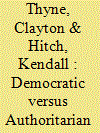

|
|
|
|
|
| Summary/Abstract |
Once considered artifacts of history, research on coups has burgeoned recently. Most studies focus on decisions to stage coups, considering factors like individual benefits, organizational interests, and government legitimacy. Less work considers what happens following coups. This article considers the political trajectory of states following coups. We argue that external reactions to coups play important roles in whether coup leaders move toward authoritarianism or democratic governance. When supported by external democratic actors, coup leaders have an incentive to push for elections to retain external support and consolidate domestic legitimacy. When condemned, coup leaders are apt to trend toward authoritarianism to assure their survival. We test our argument by considering how international responses to coups from states and international organizations influence coup states’ political trajectories. Our findings indicate that international actors play key roles in determining democracy levels of coup-born regimes.
|
|
|
|
|
|
|
|
|
|
|
|
|
|
|
|
| 2 |
ID:
175346
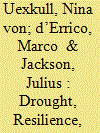

|
|
|
|
|
| Summary/Abstract |
The effects of climate variability and change on security are debated. While this topic has received considerable attention in both policy circles and academia, the microlevel pathways and conditions under which climatic shocks increase conflict risks are poorly understood. We suggest that household resilience provides one key to understanding these relationships. Using novel household survey data from two conflict-affected regions in Eastern Democratic Republic of the Congo, we study variation in the support for violence related to reported exposure to drought and resilience metrics. Using comprehensive multifaceted objective and subjective indicators of resilience, we find that less resilient respondents who report having experienced drought and associated losses are more likely to be supportive of the use of political violence. In contrast, our findings suggest that there is no general association between reporting drought exposure and support for violence.
|
|
|
|
|
|
|
|
|
|
|
|
|
|
|
|
| 3 |
ID:
175339
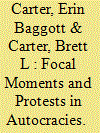

|
|
|
|
|
| Summary/Abstract |
Social scientists have long observed that focal points enable citizens to coordinate collective action. For antiregime protests in autocracies, however, focal points also enable repressive governments to prepare in advance. We propose a theory to explain when citizens are likely to employ focal points to organize antiregime protests. Our key insight is that tacit coordination is most critical when explicit coordination is costly. Empirically, we use our theory to identify a setting where focal points are likely to be salient and then argue that the anniversaries of failed pro-democracy movements satisfy conditions for focality. In China, we find that the anniversaries of failed pro-democracy movements occasion nearly 30 percent more protests than any other day. Protests during pro-democracy anniversaries are more likely to employ “rights-conscious” discourse, which scholars have argued is code for democratic resistance, and to be repressed by the government. We find no similar trends for other holidays.
|
|
|
|
|
|
|
|
|
|
|
|
|
|
|
|
| 4 |
ID:
175342
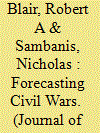

|
|
|
|
|
| Summary/Abstract |
Does theory contribute to forecasting accuracy? We use event data to show that a parsimonious model grounded in prominent theories of conflict escalation can forecast civil war onset with high accuracy and over shorter temporal windows than has generally been possible. Our forecasting model draws on “procedural” variables, building on insights from the contentious politics literature. We show that a procedural model outperforms more inductive, atheoretical alternatives and also outperforms models based on countries’ structural characteristics, which previously dominated models of civil war onset. We find that process can substitute for structure over short forecasting windows. We also find a more direct connection between theory and forecasting than is sometimes assumed, though we suggest that future researchers treat the value-added of theory for prediction not as an assumption but rather as a hypothesis to test.
|
|
|
|
|
|
|
|
|
|
|
|
|
|
|
|
| 5 |
ID:
175343
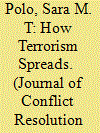

|
|
|
|
|
| Summary/Abstract |
Previous research on the causes of domestic terrorism has tended to focus on domestic determinants. Although this approach can be helpful to understand many causes of terrorism, it implicitly disregards how the tactical choices made by similar nonstate actors elsewhere influence a group’s decision to resort to terrorist tactics. This study argues that the adoption of terrorism among ethnic and ethnoreligious groups results from a process of conditional emulation. Groups are more likely to emulate the terrorist choice of others with whom they are connected by shared political grievances and spatial networks. The theory is tested on a new and original group-level data set of ethnic and ethnoreligious terrorism (1970 to 2009) using geospatial analysis and spatial econometric models. The results provide strong support for the hypothesized mechanism leading to the diffusion of terrorism and suggest that emulation—more than domestic and contextual factors—substantially influences dissidents’ tactic choice.
|
|
|
|
|
|
|
|
|
|
|
|
|
|
|
|
| 6 |
ID:
175345


|
|
|
|
|
| Summary/Abstract |
According to the resource curse theory, persistent violence in developing areas results from rebels’ ability to finance warfare with natural resource revenues. Surprisingly, this overlooks the complexities of raising revenue from a mobile mining population that values security as well as income. The literature thus neglects a fundamental question: what are the incentives of rebel groups to prevent or perpetuate conflict in mining areas? This paper delineates a rational to both increase and decrease violence. Protecting a mine should allow rebels to extract taxes in return. Simultaneously, to maintain this demand for security, rebels may need to destabilize the wider area. The hypotheses are tested with novel data on rebel taxation at over 3’000 artisanal mines in the eastern Democratic Republic of the Congo. Supporting the hypotheses, the results show that rebel-taxed mines appear exempt from violence nearby but imperiled at the perimeter.
|
|
|
|
|
|
|
|
|
|
|
|
|
|
|
|
| 7 |
ID:
175347
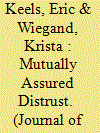

|
|
|
|
|
| Summary/Abstract |
Within the study of intrastate armed conflicts, many scholars rely on a bargaining model when explaining why some civil wars are intractable. Primarily, scholars posit that commitment problems represent a key barrier to settling conflicts through negotiations. Yet, some civil wars are more easily resolved than others. If commitment problems are a universal feature of civil wars, what explains why commitment problems are more salient in some conflicts as compared to others? We argue that ideological differences between combatants enhance commitment problems in civil wars. Assuming that ideology is used by combatants to generate support, concessions that violate the ideological goals of each side may alienate supporters. With extreme ideological polarization, concessions may be viewed as relative as opposed to absolute, making it difficult for either side to credibly commit to offer concessions. To test these claims, we quantitatively examine the duration and outcome of all intrastate conflicts from 1975 to 2011.
|
|
|
|
|
|
|
|
|
|
|
|
|
|
|
|
| 8 |
ID:
175340
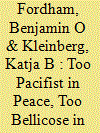

|
|
|
|
|
| Summary/Abstract |
Scholars of public opinion and foreign policy recognize that the general public is poorly informed about international affairs, but they disagree about whether and how this fact affects the policies that it will support. Some argue that the lack of information has little effect, at least in the aggregate, while others hold that political information mediates attention to elite cues. We investigate a third line of argument in which political information has a direct effect on the policy options individuals support. Low levels of political information give rise to a pattern of complacency toward likely international threats in times of relative peace and a contrasting tendency to support violent and aggressive policy options during war or acute crises. We test this argument using survey data from two relevant historical settings: the American entry into World War II and the response to the 9/11 terrorist attacks.
|
|
|
|
|
|
|
|
|
|
|
|
|
|
|
|
| 9 |
ID:
175344
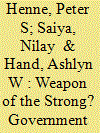

|
|
|
|
|
| Summary/Abstract |
This article addresses a puzzle in terrorism studies. That terrorism functions as a “weapon of the weak” is conventional wisdom among terrorism researchers. When it comes to religious communities, however, often it is those groups favored by the state—rather than repressed minority communities—that commit acts of terrorism. We argue that this is because official religious favoritism can empower and radicalize majority communities, leading them to commit more and more destructive terrorist attacks. We test this claim using a statistical analysis of Muslim-majority countries. Our findings support the idea that the combination of state support of religion and discrimination against minorities encourages terrorism from majority religious groups.
|
|
|
|
|
|
|
|
|
|
|
|
|
|
|
|
|
|
|
|
|